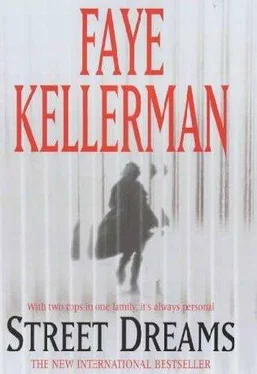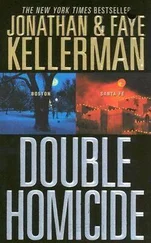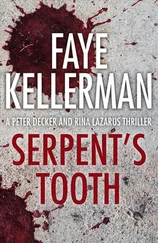“I know. I was there.”
Klinghoffner turned red. “Of course… I am so sorry-”
“It’s fine, sir. I shouldn’t have even brought it up.”
“It must have been a terrible shock to witness something so terrible.”
“Yes.”
“I’m sorry, but I do have to go.”
“Of course.”
“Not that I mean to dismiss you-”
“No, no, I understand.”
But it seemed that everyone was dismissing me these days.
If there were D.T.’sfrom too much food, Decker was experiencing the phenomenon. Rina had learned cooking from a pro, but over the years, she had lightened the cuisine. Her sauces weren’t as heavy, her side vegetables barely blanched and often served plain except for a little salt. Mama was still in the old country, serving mass quantities of heavy food. But that didn’t stop Decker from stuffing his face. If he had eaten any more chicken paprikash, his face would have turned red and blotchy. But self-loathing had an upside: His mother-in-law was very pleased with his gustatory enthusiasm.
“It’s always a pleasure to serve you,” she told him. It came out: Eets alvays a pleasurrrre to serrrrve you. Her Hungarian accent was light and lilting.
Magda Elias was wearing a blue pullover sweater and white jeans. She was still beautiful and trim-a woman who took pride in her appearance. Her dyed black hair was always coiffed and she always wore makeup. Rina was a simpler, younger version of her mother.
They were eating in the formal dining room-a paean to porcelain. Magda’s breakfront was filled with her good dinner china, figurines, decorative plates, and vases. There were also a dozen pieces of expensive European silver. The woman could have opened up an antique shop.
“It’s always a pleasure to eat your cooking, Magda,” Decker parried.
Magda smiled. “You are being very charming tonight.”
“I’ve been practicing.”
She hit his shoulder. He and Rina’s parents got along well, although it hadn’t always been that way. It had taken a dozen years and the production of a granddaughter to get to this level of congeniality. He thought about that as Cindy came to mind. Decker had slipped up with Koby. He was still smoldering from her relationship with Scott Oliver and maybe that was the problem. He was too involved. Black, white, purple, old, young, female, whatever-he should have done better with her date. He made a pledge to mind his manners in the future, regardless of whom she brought home.
Sammy and Jacob pushed away their plates and groaned. Sam said, “Really dynamite, Omah, but I ate too much. No room for dessert.”
“Aaah.” She dismissed his announcement. “Just a leetle strudel. Mostly fruit.”
“Apple?” Sammy asked.
She nodded. “And a little nut cake.”
“There are cookies, too,” Jacob added. “I saw them in the kitchen.”
“For Hannah!” Magda explained.
“Where’s Papa?” Rina asked.
Magda pointed to the back room. Without fanfare, Stefan Elias had retired to the den, to his chair and his TV programs. Usually the routine required Decker to join him between dinner and dessert. Rina began helping her mother clear the dishes. Decker picked up a platter. He whispered to his wife, “So when are we going to talk about Hannah’s family-tree report?”
“Soon, soon,” Rina told him.
“Why don’t you just tell her-”
“Shhhh.”
Decker rolled his eyes. “Are you going to wash the dishes?”
“No, the boys are going to wash.”
“We are?” Jacob said.
“Most definitely.”
Magda interjected, “I have a dishwasher.”
She had a deeshvasher.
Rina said, “This is good china.”
“I have a delicate cycle, Ginny. You think I live in the nineteenth century?” She turned to her grandsons. “You just rinse and put it in the racks, okay? Then you work up an appetite for dessert.”
Sammy said, “Yeah, I hear that dishwashing is the new aerobics, Omah.”
Decker smiled and elbowed his son’s ribs.
Magda said, “You go join Stefan, Peter? He is expecting you.”
“In a few minutes. I wanted to hear you talk about your family with Hannah.”
“I don’t have much to tell.” Magda’s face tightened. “It was not a happy childhood.”
“I know that.” Decker went over to her and kissed her cheek. “If it’s too hard, we can skip the childhood and start with after you came to America.” Rina gave him dagger eyes. He ignored her. “It’s totally up to you.”
“That would be better.” Magda went back to the dinner table and began gathering dirty dishes.
“The boys will do that,” Rina said. “Sit.”
“No, I like to move around.”
Decker said, “Like mother, like daughter.”
They brought a new round of soiled dishes into the kitchen.
“Oh goody,” Sammy said. “I was almost through and just hoping for more.”
“Stop complaining,” Rina told him.
Magda went back out to the dining room. Decker and Rina followed.
“Sit down, Magda,” Decker told her. “The boys can get the rest.”
The old woman sat.
Rina said, “How come you listen to him and not to me?”
“He eats my food,” Magda retorted. “Where is Channaleh?”
“With Opah,” Decker answered.
It was interesting how he called Rina’s mother Magda but Rina’s father was Opah-grandfather. Decker sat on one side of his mother-in-law, Rina on the other. “The two of them are watching Animal Planet. How about we do this, Magda? You go over your childhood really briefly so Hannah will have something to put down. Not more than a couple of minutes. Just things like where you lived in Germany, what you remember about Munich before you moved to Budapest-”
“Not too much,” Magda said. “I moved when I was nine.”
“What year was that?” Decker asked.
“It was 1928 or maybe 1929. Before ’33. We moved because my mother died.” She whispered, “You know about her?”
Decker nodded. “I know what happened to her, yes.”
She looked around nervously. “I don’t want to tell Hannah this.”
“I agree,” Decker said. “Too much for her.”
Magda went on. “Then in Budapest, my father met my stepmother and they get married. They have three children together. So with my sister and me, we are five. Only my sister and I survived. I was at Monowitz, you know. That was the goyish side of Auschwitz. All the rest of the family went to Birkenau. Only my sister Eva made it through. I still see her. She lives in New York. She married very well.”
“So did you,” Decker said.
“Yes, I did,” Magda confirmed. “I married the best!”
Rina smiled. It was wonderful how much her parents still loved each other.
“Is Eva a whole sister or half sister?” Decker asked.
“Half sister,” Rina said. “The middle of the three girls from Mama’s stepmother.”
“And Eva only survived because she was transferred back to Dachau-not to the main camp but to one of the smaller camps.” Magda’s face tightened. “There were many smaller camps-twenty, thirty in southern Bavaria-all of it Dachau. You know?”
Decker shook his head and looked at his wife.
“Satellite camps,” Rina said. “The entire complex was referred to as Dachau. It was very ironic. Hitler had succeeded in making Germany Judenrein -Jewish free-but then toward the end when things were falling apart, he became desperate for domestic labor. So he brought the Jews back into Germany to work in armament factories-slave labor. Most of these smaller camps produced weapons and armaments, but they were also death camps. We don’t have to talk about this, Mama. How about happier times, like earlier in your childhood?”
Читать дальше












